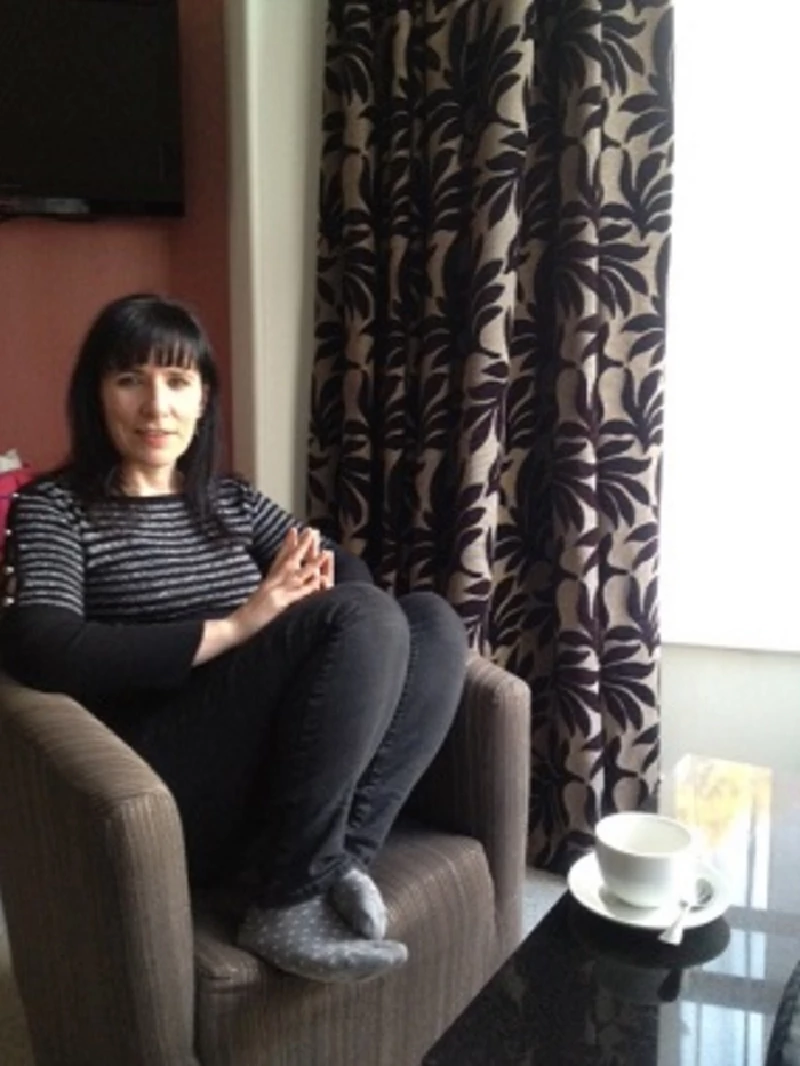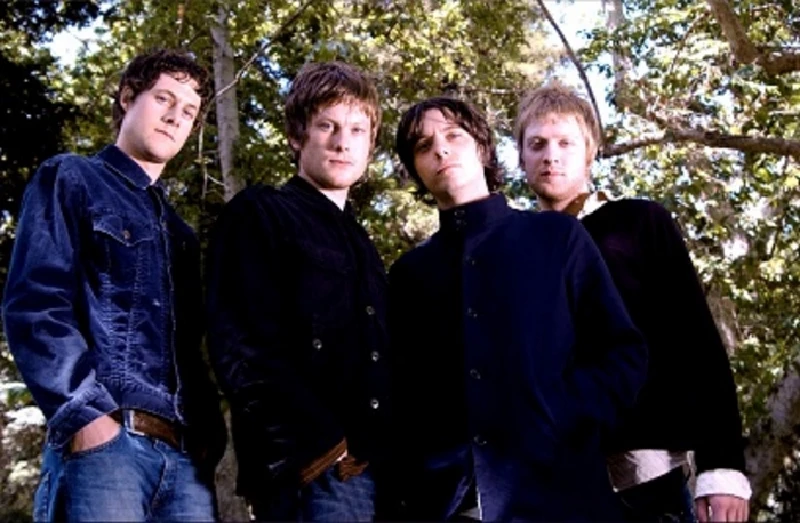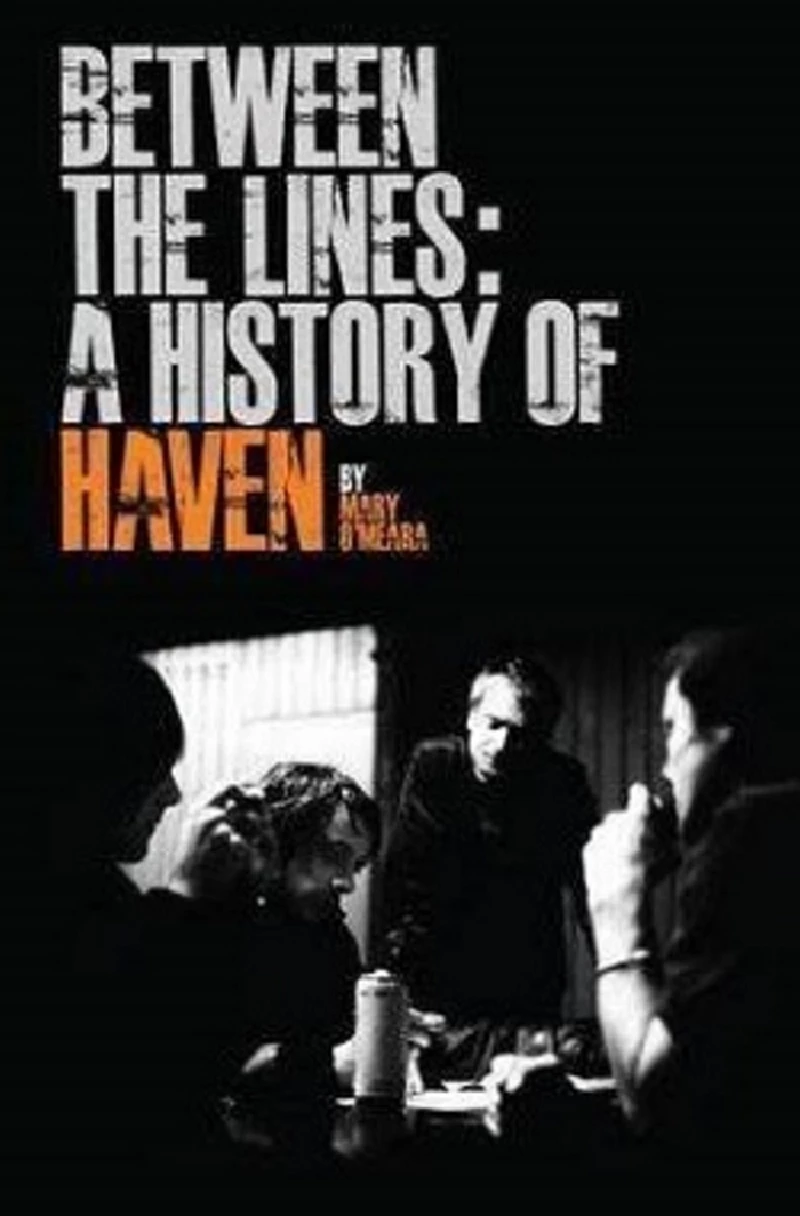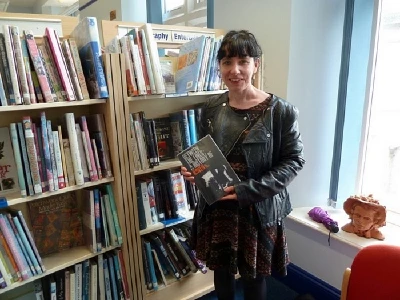Mary O'Meara - Interview
by John Clarkson
published: 14 / 11 / 2014

intro
John Clarkson talks to Pennyblackmusic writer and author Mary O'Meara about her biography on 90's indie/alternative rock band, Haven
Haven were an indie/alternative rock band of the late 1990s and early 2000s. Formed in Cornwall, the group was discovered by the Smiths’ first manager, Joe Moss, whilst he was on holiday there. Moss encouraged Haven, which consisted of Gary Briggs (vocals, guitar); Nat Wason (guitar); Iwan Gronow (bass) and Tom Lewis (drums, replaced 2000 by Jack Mitchell), to move in 1999 to Manchester, where he acted as both their manager and mentor. Haven signed to Radiate, a fledgling offshoot label of Virgin Records. Their debut album, ‘Between the Scenes’, which was produced by the Smiths’ Johnny Marr, came out in 2002, and, reaching no. 26 in the UK Album Charts, sold nearly 100,000 copies. They also had Top 30 hits in the same year with the singles, ‘Say Something’ and ‘Till the End’. Although Haven toured both America and Japan, with ‘Between the Senses’, this early success, however, was not to last. Their second album, ‘All for a Reason’ (2004), which was produced by Dave Eringa who had worked with Idlewild and Ash, with additional production from Marr, was hampered by a series of studio problems and, although it had several first-rate songs, was not as well-received as the first. Virgin closed down Radiate in 2005 as the record industry started to fall into recession, and Haven failed to find another record label. While a third self-produced album was recorded, it was never released. Its members, despite attempting to get back together on several occasions, also began to drift apart as they became involved with other projects, Gary Briggs and Nat Wason with Strays, and Iwan Gronow and Jack Mitchell with the Mutineers. The story of the band which nearly but through bad fortune didn’t quite make it is not an uncommon one, and has been described by other authors in other books about other bands many times before. Mary O’Meara in her masterly 2012 biography, ‘Between the Lines: A History of Haven’, however, gives it a fresh slant and approach. Mary, wanting a change of location, moved from her native South London to Manchester in late 2002, shortly after folding her long-term Manic Street Preachers’ fanzine ‘Terrible Beauty’, and began both a record label Urban Foxx and also an accompanying publication ‘Urban Scrawl’. She found herself living in the South Manchester suburb of Heaton Moor where, although she had already interviewed Haven for ‘Urban Scrawl’, she was to discover by bizarre chance that she had moved into the house next door to them. Both Mary and the members of Haven became friends, regularly congregating at the nearby Blue Cat Café, a bar and small venue, where Mary would put on several launch nights for Urban Scrawl releases and also at one point work as a promoter, and the band, which had played their first Manchester gig there, would continue also to perform. Mary, who is also a contributor to Pennyblackmusic, started working on ‘Between the Lines’ in 2005. The book, partially autobiographical, is as much a reflection on friendship, her own with the group and its members’ relationship with each other, as it is about the rise and slow decline of a rock band. Pennyblackmusic spoke to Mary about ‘Between the Lines: A History of Haven’. PB: There seems to have been a real sense of synchronicity to this book. You knew that Haven were going to be important to you before you had even heard a note. ‘Between the Lines’ opens with you buying their first single, ‘Beautiful Thing’, in Oxford Street on chance after reading about them in the ‘NME’, and then, before you went home to play it, meeting your friends in a pub and telling them that you thought this could be a really special band. MO: It did feel that way (Laughs). I am quite prone to premonitions. I often get a sense of something before it happens. Everything about them seemed to be sending out the signal or the message of “Take note”. A lot of it coincided with me leaving London and moving to Manchester. They had also left Cornwall a couple of years before that to live in Manchester. Our lives ran parallel with each other for a long while. PB: You worked at the Blue Cat Café in Heaton Moor where Haven played several gigs. You also ended up living next door to them as well at one point. MO: Yeah. That was so bizarre. I couldn’t have planned that one (Laughs), and at the time I was slightly embarrassed. They probably thought that I was following them around, but it was entirely coincidental. Even when I moved a second time, I still found myself living around the corner from Nat, who I didn’t know had just moved there as well. (Laughs). Things like that kept happening. I don’t know if I really believe in destiny or not, but there did seem to be an element of destiny in writing this book and meeting the band. PB: What was the appeal to you of their music? Why did you like them so much? MO: It was the emotional impact of their music first of all. Their songs are just very anthemic, but they are also very subtle. Their music just sent shivers down my spine from the first time that I heard it. I was also a very big fan of Johnny Marr beforehand, and obviously he was involved. While he didn’t play on the records, he did produce them and his influence crept in, although they were totally their own thing as well. It may have been their Cornish background, but there was something slightly ethereal and mysterious about them as well. It was all of those things together really. I just liked everything about them. PB: You were in a unique situation when you wrote this book as you had become friends with them. A lot of biographers are more detached from their subject matter. It is one of the really good things about the book. Did you see it as a constriction as well? MO: Yes, it had a positive and a not so good side to it. I felt quite protective of them because they are good friends. I wanted to be objective and I hope I have been, but there were certain things where I felt, “I can’t write about that.” Some people have said to me that I should have revealed even more, but I actually think that it is a very revealing book. Some of it though is “between the lines.” When you are close to people, you do really think extra-carefully about how you want them to be portrayed. Even though I utterly wanted them to be portrayed truthfully – and they think that they have been – there were bits that I struggled with, in which I was thinking, “I don’t know how much to say and not to say.” I was never going to write one of those tell all books though. That is not who I am. I think you need to keep some privacy. PB: The bulk of the book was apparently written by 2008, yet you took another four years to publish that. Were you hanging on to see what happened and if they would finally get back together? MO: Yes, partly. I didn’t want it to end on a downer (Laughs). Strays, the second band that Gary and Nat formed, were absolutely amazing. They eventually fizzled out too, but at the time in 2008 they were starting to do well and I didn’t know if they were going to be something really big. As much as anything, I suppose I was hanging on to see what happened and to try to give it a positive ending. PB: And you did as the book concludes in April 2011 with Haven reuniting briefly for a one-off gig at the Blue Cat Café to celebrate Jack’s thirtieth birthday. MO: That’s right. Yeah. It’s a nice little ending. PB: How did the band react to it when they finally saw ‘Between the Lines’ and read it? What did they think of it? MO: They were all complimentary, but I think, however, that some of them found it difficult to read because it is so personal, which is understandable. I don’t think that it is ever easy to read about yourself in such a personal way. They all appreciated it, but I can’t imagine any of them wanting to sit down and read it a second time (Laughs). I know that they all found it really emotional. They all said that, but I am pleased with the comments that I got. I don’t think anyone was hugely upset by it, which was always a risk (Laughs). PB: At what point do you think that it went irretrievably wrong for them? MO: It’s very hard to say, isn’t it? In hindsight you can say it was this or that, but sometimes there is not just one reason. There was a lot of bad timing with the second album certainly. There was this hiatus when they were hanging in the air for so long. For a long time they were trying to do something with that third album , which was recorded but never released, and for a long time that could have happened, but they had become fragmented themselves, with each other to some extent as well and they were all doing different things, so they weren’t pulling together. If they had really pulled together, perhaps it would have gone the other way. PB: They were about five years too early for things like PledgeMusic and Kickstarter, weren’t they? MO: Yeah, that’s right, which would have been an option if that had been around. PB: Why do you think that you never went down the independent route? At one point they were talking with your label Urban Foxx about doing something. MO: Yes, that was talked about a lot, and they did have some offers as well. There were a few labels – I think Sanctuary was one of them - that were interested, but it didn’t come to anything. I don’t know why that happened, whether they disagreed between themselves or whether they didn’t know who to go with. They didn’t have strong management at that point, and I think that was a factor. PB: When ‘Between the Lines’ came out in 2012, did anyone get in touch then offering them a comeback gig? MO: There was this guy, who does a club night, This Feeling, in London. He got in touch with me, asking if they would be interested in doing some kind of return gig around the publication of the book, and we did talk about that and again they were going to half do it (Laughs) and in the end they didn’t. They are very all or nothing. I suppose they thought, “We can’t get together and do one gig. We are either getting back together or we’re not.” Even now I hear the odd rumour that something like that might happen. I don’t think that it has entirely run out of steam. PB: The book stops in 2011. What’s happened in the three years since then to its members? MO: Jack is playing drums and Iwan the bass in Johnny Marr’s group. Nat is in Ben Howard’s band. Gary has been quietly working on his own material, and we may see something from him eventually. PB: Who are your publishers, Troubadour, who published ‘Between the Lines’? MO: They are a self-publishing company. I am really glad that I did it that way. I was going to try to send it around people, but I just wanted to get it out in the end. It does give you lots of control when you self-publish. I could have the typeface I wanted, for example. Troubadour didn’t want me to have the typeface that I used, but I really liked it. You just have all kind of freedoms when you self-publish. It wasn’t particularly expensive to do really, so when I do my next book I will possibly be using them again because they are very easy to work with. PB: You are now working on your first novel, aren’t you? MO: Yes, it is called ‘A Certain Kind of Light’. I'd love the song ‘To Love Somebody’, which was recorded originally by the Bee Gees and since has been covered by Jimmy Somerville, to be on the soundtrack if it ever becomes a screenplay! Its title comes from its opening lines, "There's a light/A certain kind of light.” It is an unconventional love story, but in what way it is unconventional I would rather keep as a surprise for now. PB: On top of that you are starting up again your Manic Street Preachers’ fanzine, ‘Terrible Beauty’, as well. MO: Yes, I began it originally in 1995 when I was in my final year at university. It was around the time that Richey Edwards had gone missing, and I was really affected by that. It seemed like it was a really positive thing to do because there was a really strong fan community and it helped to pull people together. I never expected it to go on as long as it did, but it went on for seven years. This was before the days of email, and it became a hugely time-consuming thing. People would be writing to me ten page letters, and I had to fold it at some point because, much as I loved it, it really did take over my life and I just couldn’t carry it on. PB: So, why have you decide to start it up again? MO: I think that the Manics have been totally back on form with the latest couple of records, ‘Rewind the Film’, and ‘Futurology’. It is not that I didn’t like the stuff in between, but it didn’t excite me as much as this new material. I just felt that I wanted to do something to reconnect with what I had done before. I am not really necessarily intending on carrying it on, maybe for one or two issues, three issues at the most, depending how things go. I just wanted to dip back into that world for a little while and then maybe get out again (Laughs). There are so many other things that I want to do as well. PB: Thank you. Both ‘A Certain Kind of Light’ and ‘Terrible Beauty’ will come out next year.
Picture Gallery:-


profiles |
|
1966-2017: An Appreciation (2018) |

|
| John Clarkson pays tribute to our writer and his friend Mary O'Meara who died in December. |
| Interview (2017) |
| A Certain Kind of Light (2017) |
most viewed articles
current edition
Carl Ewens - David Bowie 1964 to 1982 On Track: Every Album, Every SongArmory Show - Interview with Richard Jobson
Colin Blunstone - Thalia Hall, Chicago, 16/7/2025
Visor Fest - Valencia, Spain, 26/9/2025...27/9/2025
Bathers - Photoscapes 1
John McKay - Interview
Loft - Interview
Billie Eilish - O2 Arena, London, 10/7/2025
Robert Forster - Interview
Sir Tim Rice - Interview
previous editions
Heavenly - P.U.N.K. Girl EPManic Street Preachers - (Gig of a Lifetime) Millennium Stadium, Cardiff, December 1999
Beautiful South - Ten Songs That Made Me Love...
Oasis - Oasis, Earl's Court, London, 1995
Pixies - Ten Songs That Made Me Love...
Boomtown Rats - Ten Songs That Made Me Love....
Prolapse - Interview
Trudie Myerscough-Harris - Interview
Peter Perrett - In Dreams Begin Responsibilities Interview Part One
Simon Heavisides - Destiny Stopped Screaming: The Life and Times of Adrian Borland
most viewed reviews
current edition
Amy Macdonald - Is This What You've Been Waiting For?Sick Man of Europe - The Sick Man of Europe
Lucy Spraggan - Other Sides of the Moon
Phew, Erika Kobayashi,, Dieter Moebius - Radium Girls
Davey Woodward - Mumbo in the Jumbo
Alice Cooper - The Revenge of Alice Cooper
Bush - I Beat Loneliness
Suzanne Vega - Flying With Angels
Blueboy - 2
Cynthia Erivo - I Forgive You
Pennyblackmusic Regular Contributors
Adrian Janes
Amanda J. Window
Andrew Twambley
Anthony Dhanendran
Benjamin Howarth
Cila Warncke
Daniel Cressey
Darren Aston
Dastardly
Dave Goodwin
Denzil Watson
Dominic B. Simpson
Eoghan Lyng
Fiona Hutchings
Harry Sherriff
Helen Tipping
Jamie Rowland
John Clarkson
Julie Cruickshank
Kimberly Bright
Lisa Torem
Maarten Schiethart